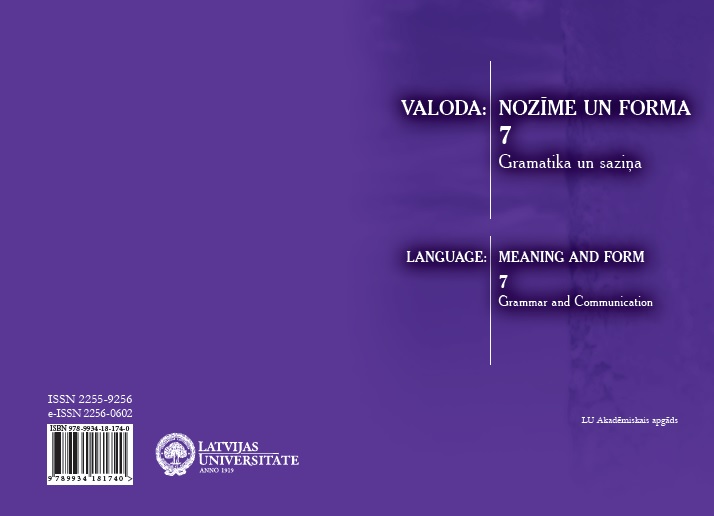Izteicēja funkcijā lietoti lietuviešu valodas ciešamās kārtas pagātnes un tagadnes divdabji un to atbilsmes latviešu valodā
Lithuanian present passive participle and past passive participle as predicates and correspondences of them in Latvian
Author(s): Kristine Levane-PetrovaSubject(s): Language and Literature Studies, Theoretical Linguistics, Applied Linguistics, Comparative Linguistics, Baltic Languages
Published by: Latvijas Universitātes Akadēmiskais apgāds
Keywords: paralēlo tekstu korpuss; ciešamā kārta; ciešamās kārtas pagātnes un tagadnes divdabis; darāmā kārta; izteicējs;
Summary/Abstract: The objective of this study is to establish the correspondences of the Lithuanian past passive and present passive participles as predicates in Latvian. This study is based on the Lithuanian-Latvian-Lithuanian Parallel Corpus (LiLa) Lithuanian-Latvian subcorpus of different genres (fiction, journalism, documents, etc.) that contains ~3.5 million running words.Based on analysed data, it is proved that past passive and present passive participles as predicates in Lithuanian is used more widely than in Latvian.It was established that Lithuanian past passive and present passive participle as predicate has various correspondences in Latvian: 1) passive voice and past passive participle as predicate (ir/tika mests). The sentences have been used in passive in both languages. Usually the corresponding Latvian predicate has been used in the same tense and mood as in Lithuanian. 2) Active voice and active verb forms as predicate (meta). The examples in Lithuanian have been used in passive, but corresponding sentences in Latvian have been used in active voice. Not all the correspondences are regular. There are some examples with the corresponding predicate in Latvian that has been used in debitive — mood that does not exist in Lithuanian. The necessity has been expressed by other means in Lithuanian. 3) Passive present participle as predicate (ir metams). Passive present participle in Latvian usually express necessity (ir metams) and possibility (celtne ir ieraugāma). Althought it is proved that active voice in Latvian has been used more widely than in Lithuanian, many examples in active voice in Latvian clearly have meaning of passive voice.
Journal: Valoda: nozīme un forma
- Issue Year: 2016
- Issue No: 7
- Page Range: 104-115
- Page Count: 12
- Language: Latvian

